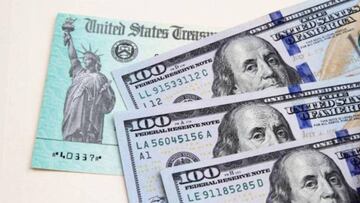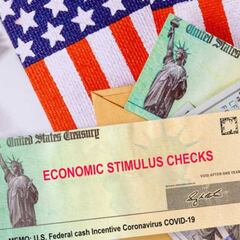Stimulus check: what to do if the deadline has passed?
The deadline to receive a $1200 stimulus payment in 2020 has passed but fear not if you didn’t get yours, you can still apply for one in 2021.

The IRS extended the deadline to register for an Economic Impact Payment in 2020 until 21 November. More than 160 million eligible Americans received the one-time $1200 stimulus check payment but there were millions who had not.
If you didn’t receive an Economic Impact Payment, you may be able to claim the #IRS Recovery Rebate Credit in 2021: https://t.co/dwDsBkf1Xr #GetReady pic.twitter.com/DqB9HUEToQ
— IRSnews (@IRSnews) November 24, 2020
Also due to changes that were made after the passing of the CARES Act more were entitled to the $500 payment for dependents that missed out on that as well. In both cases, those people are still eligible to receive the payment, just not this year.
Can I still get the first stimulus payment if there is a second?
There has been extended discussion of a second round of stimulus check payments throughout the fall however the negotiations on any new covid-19 relief spending has been deadlocked for months. Joe Biden has been pushing for more stimulus spending from the sidelines and now as President-elect has put himself more directly into the discussions to get a deal before the end of the year. Whether or not that means a new round of Economic Impact Payments has yet to be seen.
Even if there were a new round of stimulus checks, those who didn’t receive a payment in the first round and were eligible can still claim the first payment, just not this year.
How can I still apply for the first stimulus check?
The IRS extended the original 15 October deadline by five weeks in order “to provide more time for those who have not yet received a payment to register to get their money, including those in low-income and underserved communities.” However, the IRS said any further extensions beyond November “would adversely impact our work on the 2020 and 2021 filing seasons." Those who missed the deadline will still have the opportunity to receive a stimulus benefit in the form of a tax rebate next year when they file a 2020 income tax return.
“When people file their 2020 taxes next year and they weren’t eligible for an Economic Impact Payment this year, they may be eligible for the Recovery Rebate Credit,” the IRS has explained. “The Recovery Rebate Credit is figured like the Economic Impact Payment, except the amounts are based on tax year 2020, instead of tax year 2019 or tax year 2018, information.”
Is your tree already up? Since you’re ahead of the holiday season, why not #GetReady now for the 2020 tax season? Check this #IRS tip: https://t.co/DThiqtLI6d pic.twitter.com/yvdzcrl1Ls
— IRSnews (@IRSnews) November 23, 2020
After the CARES bill was signed into law in March the IRS began sending out $1,200 checks for individuals, with an additional $500 for any dependents under the age of 17. Those who file annual income tax statements should have received theirs automatically but anyone who does not file with the IRS may not have been included.
Check the status of your stimulus check
If you filed a 2019 or 2018 federal income tax return and still haven’t received an economic income payment – or if you registered with the IRS and didn’t get a payment – you can use the IRS Get My Payment tool to check the status of your payment.
Who is eligible for a stimulus check?
According to the IRS, you are eligible for a stimulus check if you:
- Have a valid Social Security number,
- Could not be claimed as a dependent of another taxpayer
- Had adjusted gross income under certain limits ($150,000 for married couples filing joint returns; $112,500 for head of household filers; $75,000 for all other eligible individuals)
Which eligible Americans might not have received an Economic Impact Payment?
The Government Accountability Office estimates that there are around 8.7 million eligible individuals who have yet to receive their stimulus check from the IRS.
- People that didn’t file an income tax statement in 2018 and 2019
- People who don’t normally file income taxes may still be eligible for a payment. Those with an income below $12,200 ($24,400 for married couples)
- College students not claimed as dependents
- People who get veterans or railroad retirement, Social Security Income (SSI) or Social Security benefits.
- Homeless or transient individuals & families
The IRS needs your help to locate these people
Related stories
If you know someone in these groups it could make a real difference for them and the IRS is trying to get the word out. So, if you know anyone who might qualify for a payment reach out and let them know.
Beware of covid-19 relief fund scams
Unfortunately, there are people out there that try to take advantage of this situation to steal money from those that need it most. All individuals should be aware of scams to claim these funds, the FTC provides a list of 4 things you can do to avoid coronavirus relief payment scam.
- Don’t respond to calls, texts, or emails about money from the government—or anyone asking for your personal or bank account information. Government agencies like the IRS will not call, text, or email you about your relief payment.
- Don’t pay anyone to get your relief payment. There are no fees to get your money.
- Don’t respond to anyone who says your payment was too high, and tells you to repay the money by sending cash, a gift card, or a money transfer. That’s always a scam
- Never click on links in emails, texts, or on social media about your relief payment. Always start at irs.gov/coronavirus to check your eligibility, payment status, enter direct deposit information, or find out what to do to get your payment.


